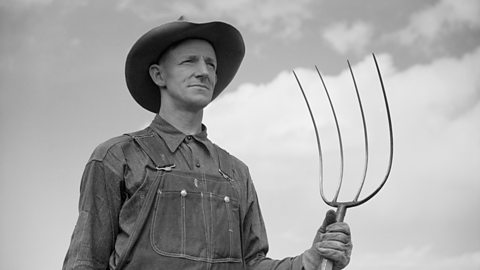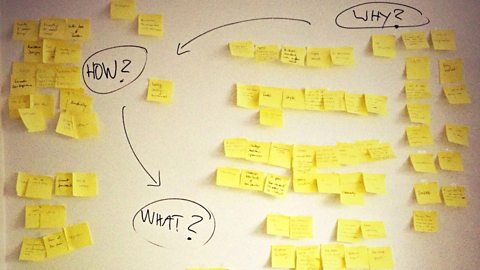- It is important to plan your critical essay before you start writing.
- An essay has a clear structure with an introduction, paragraphs with evidence and a conclusion.
- Evidence, in the form of quotations and examples is the foundation of an effective essay and provides proof for your points.
Learn how to plan, structure and use evidence in your essays
Planning
It is important to plan before you start writing an essay.
The essay question or title should provide a clear focus for your plan. Exploring this will help you make decisions about what points are relevant to the essay. What are you being asked to consider?
Organise your thoughts. Researching, mind mapping and making notes will help sort and prioritise your ideas. If you are writing a critical essay, planning will help you decide which parts of the text to focus on and what points to make.

Introduction
An introduction should focus directly on the essay question or title and aim to present your main idea, in your answer. In an essay titled âWhat makes Slim an important character in John Steinbeckâs Of Mice and Men?â you could start with:
'Slim plays an important role in Steinbeckâs novella because he represents moral authority.'
The statement gives a clear answer to the essay question. The rest of your essay could justify that answer by looking at all the different ways that he seems to represent moral authority, and the impact that has at different points in the story.
An introduction briefly introduces your main ideas and arguments - that the rest of the essay will explore this in greater detail.
When writing an introduction to an essay avoid:
- using the phrase âIn this essay Iâm going to write about âŠâ
- launching into a close analysis of the text
- straying away from the topic

Using evidence
Evidence is the foundation of an effective essay and provides proof for your points.
For an essay about a piece of literature, the best evidence will come from the text itself.
Back up each of your supporting statements with evidence. The evidence should be relevant and clearly connected to the point youâre making.
In a critical essay, evidence could take the form of:
Quotations from the text, for example, Steinbeck describes Slimâs âgodlike eyesâ, which suggests his power and authority on the ranch.
Examples from the text, for example, Slimâs reaction to the fight between Lennie and Curley shows his authority and natural leadership.

Paragraph structure
Think about how you are going to organise each paragraph.
You might want to start with a topic sentence that summarises the main point of the paragraph. This sentence acts like a mini introduction for this paragraph of the essay:
'Because the other men on the ranch respect him, Slim is able to influence their actions.'
The rest of the paragraph should then develop this main point by providing more explanation, detail and evidence:
'After the fight between Curley and Lennie, Slim takes charge. âI think you got your han' caught in a machine,â he persuades Curley, defusing the situation and preventing Lennieâs dismissal from the ranch.'

Conclusion
A conclusion is the final paragraph of your essay. It should tie all the loose ends of your argument together.
An effective conclusion may:
- restate your main idea
- directly link back to the essay title or question
- briefly summarise the key supporting points
- give readers something to remember - a final thoughtful idea or reflection
Itâs useful to show the reader that you have reached your conclusion by using words or phrases such as:
- In conclusion
- To conclude
- Finally
- In summary
Remember
Thinking about what to include in a critical essay first will make it easier to structure and write the essay. Your essay will be much more convincing if you can offer evidence for each of your ideas.
Quiz
Are you ready to write an essay? Let's find out in this short quiz!
More on Critical essay writing
Find out more by working through a topic